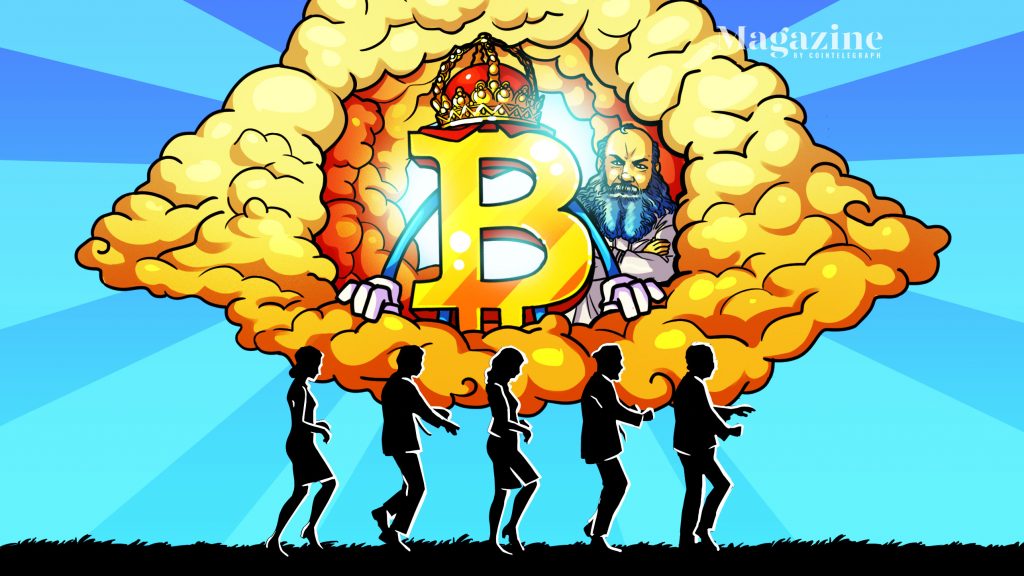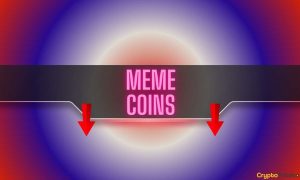Is Bitcoin a religion? If not, it soon could be – Cointelegraph Magazine

Hass McCook is a respected Sydney-based civil engineer who has worked on some of the most spectacular buildings in the world, from Munich’s Allianz Arena to Singapore’s Marina Bay Sands.
He also considers Bitcoin to be his religion.
Better known on Twitter as Friar Hass, the 35-year-old had a religious epiphany about Bitcoin in 2017.
In a tale reminiscent of the Bible’s The Trials of Job, McCook bought Bitcoin three years earlier at $1,000 a coin and watched it lose 90% of its value. He then lost a substantial proportion of the remaining sum when the Bitfinex exchange was hacked.
“That sent me down into the psychological and spiritual gutter,” he says. “And I came out of that with a religious experience.” He’s not being ironic.
“They always say in times of tragedy and trauma, people turn to God. That is sort of what happened with me. It’s tough to describe the experience, but basically, the best way I can describe it is I went to Bitcoin.”
As a member of the Bitcoin Mining Council and friendly with MicroStrategy’s Michael Saylor, McCook views Bitcoin as a form of energy, and as Einstein was fond of pointing out that when it comes down to it, everything in the universe is energy.
I literally WENT to Bitcoin, and now Bitcoin is my religion@dergigi
— Friar Hass (@FriarHass) July 11, 2021
“It was the culmination of all of my learning, experience and trauma — it was the realization that you and I, in long-term equilibrium, are just Satoshi,” he says. “Every atom in the universe through heat and energy transfer, one day will become literally Bitcoin.” He adds:
“It’s a very, very powerful thing, like we get buried into the ground, we go into the ground, become worm food, circle of life and eventually it ends up in the grid. You literally end up in Bitcoin.”
When this feature was first commissioned, it was intended to be a fun exploration of the idea that the culture around Bitcoin is metaphorically a bit like a religion. But, it turns out that some people are starting to view it as a literal religion — or at least an ideology or even a cult that has the potential to turn into one.
It sounds crazy — maybe it is crazy — but there’s more substance to the idea than you might expect.
Bitcoin Holy Capitol
The religious echoes seemed pretty obvious to many observers of the recent Bitcoin 2021 conference in Miami.
The New York Times article was titled “Thousands descend on Miami to glorify Bitcoin” and quoted the convention center’s owner Moishe Mana saying: “The more you fight religion, the more holy it becomes and the stronger the movement becomes,” he said.
Media outlet Paradox described how a “ten-thousand-plus legion of devoted believers” came together with “followers of Bitcoin maximalism” to listen to the high priests of the movement:
“Before thousands of wide-eyed attendees like Joel Olsteen preaching at a megachurch, prophets like Michael Saylor called Bitcoin the ‘apex’ of human achievement, while architects of the Holy Capitol blatantly acknowledged the asset as a full-fledged religious movement.”
And just like followers of a religion, Bitcoiners believe, with some justification, that they’re on a righteous mission to change the world. Twitter’s Jack Dorsey told the crowd: “I don’t think there is anything more important in my lifetime to work on.”
Established 2012
The concept dates back to at least late 2012 when Bitcointalk forum user Crazy-rabbit posted:
“I’m sure people have noticed how eerily similar to religion Bitcoin is becoming. The mythical founder, the email disciples, the followers… So why doesn’t someone just do it already and register the Church of Satoshi? There is certainly enough philosophy here.”
As it happened, a satirical Bitcoin Church had commenced operations a month earlier, urging followers to “Praise Bitcoin” and “Honor the Blockchain.” A more sincere effort called The Church of Bitcoin was established in August 2017 by Henry Romp, urging members to ”Distribute our scripture, the whitepaper written by Prophet Satoshi Nakamoto.”
The chief narrative officer at Qi Capital, Jonny Qi, tells Magazine that as a spiritually inclined person, he began to notice parallels soon after he got into crypto in 2017.
“You have this charismatic leader who disappeared, Satoshi, and then you have a white paper which acts as a holy paper, and if you kind of go against it, you’re basically not part of their religion anymore and they’re going to attack you. So all the basic fundamentals to build a religion are there.”

The commandments
Bloomberg’s Joe Weisenthal neatly laid the parallels out in an article earlier this year, calling Bitcoin “the first true religion of the 21st century.”
He noted Bitcoin’s first block was called the Genesis block and that Satoshi appears to have been self-sacrificing and benevolent, having departed this world before he sold a single coin. He likened the white paper to the Bible, Hal Finney to a saint, Bitcoin Pizza Day and the Halving to religious holidays and the Bitcoin Cash fork to a religious schism. Weisenthal also wryly noted that “orthodox” Bitcoiners adhere to a diet of meat only.
“Prophets, apostles, holidays, dietary customs, sacred texts, schisms, sayings and more. Bitcoin isn’t like a religion. This is just what a religion is.”

While the article was tongue in cheek, the metaphor runs surprisingly deep. Bitcoiners go out into the world and proselytize the tenets of the faith: Anti-inflationary hard money, decentralization and uncensorable transactions, which will help good win against evil (bankers). They demonstrate their faith by hodling, participating in rituals such as “buying the dip” and telling nonbelievers (nocoiners) of the miracles in which the poor transformed pennies into Lambos in Bitcoin’s version of transubstantiation.
Many Bitcoiners believe in an apocalyptic-style scenario when the existing fiat-based financial system finally collapses. In a blog, McCook described “Judgment Day” as a forthcoming period: “Viewed by many Bitcoiners as a devastating economic event, the death of fiat.”
“Ultimately, this will lead to total civilizational collapse or the phenomenon of ‘hyperbitcoinization,’ effectively when all global trade is conducted in Bitcoin, and its market capitalization is in the dozens of trillions, if not hundreds.”
Cointelegraph Magazine contributor Elias Ahonen, a former seminarian, wrote an entire chapter about the similarities in his book Blockland.
“I actually spent a semester at a Bible college before university,” he says. “It constantly blows me away how similar crypto and especially the Bitcoin movement is to a charismatic religion. I would dare to say that unless you’ve experienced it, you can’t understand how absurdly similar they are, to the point that they are indistinguishable.”
Bitcoin fixes everything
Bitcoin maximalists are the fundamentalists — the hardline lay preachers who keep the flock from worshiping those who they believe to be false idols, or blaspheming by purchasing shitcoins. McCook says he’s comfortable with the comparison.
“Yes, because we do have fundamentals,” he says. “There are fundamental, ethical and moral principles to Bitcoin.” While many Bitcoiners just think of it as a fun way to make money and maybe stick it to the banks, some maximalists view it more like a righteous crusade. They believe:
Bitcoin fixes this.
By which they mean, Bitcoin fixes everything.
“If you’re an actual environmentalist and if you don’t have Bitcoin, you’re not a serious environmentalist. You know, if you want to end poverty and you don’t hold Bitcoin, you’re not serious about ending poverty,” says McCook, adding:
“Because the root cause of all of our problems is basically money printing and capital misallocation as a result of that. So, the only way the whales are going to be saved, or the trees are going to be saved, or the kids are going to be saved, is if we just stop the degeneracy.”
Qi has an altogether darker view of maximalism, which he believes is a stifling form of moral superiority:
“Morality is the essence of every maximalism, a belief that somehow their system is morally superior to every other system. Bitcoin maximalists are more interested in moral superiority than sound money.”

The Bitcoin Jesus himself, Roger Ver — now the leader of the breakaway BCH sect — tells Magazine that Bitcoiners are really the only community in crypto that behaves this way.
“You see that mainly from the BTC camp,” he says. “They hate every other coin that’s not BTC. Whereas I see the Ethereum guys, they like lots of different coins, the Bitcoin Cash people like lots of different coins. Most coins are okay with other coins, but there just seems to be a pretty large contingent of people that think that BTC is the one and only true religion or one true and only cryptocurrency, and I think that’s foolish.”
Define religion then
The Oxford Dictionary defines religion in part as “A pursuit or interest followed with great devotion.” While Mirriam-Webster defines it as “a personal set or institutionalized system of religious attitudes, beliefs and practices” and “commitment or devotion to religious faith or observance.”
McCook points to those two definitions and says religions don’t need to be based around a god, citing Buddhism and Taoism.
Torkel Brekke, a professor in religious studies at Oslo Metropolitan University and the author of Faithonomics: Religion and the Free Market, agrees that “it’s absolutely reasonable to say that you can have a religion without a strong concept of a divine being.”
Brekke says that what all religions do share is a strong social aspect. “They feel they have a very strong sort of sense of being a community that is something special, different from other communities,” and followers perform rituals such as prayer or singing to create strong emotions.
He notes that many established religions now conduct these gatherings and rituals online. Could Crypto Twitter be the place where the Bitcoin faithful congregate to feel the elation as the price rises and the crushing disappointment when it falls? (Technically speaking, hodlers shouldn’t care about short-term price movements if they’re not going to sell, but a price increase seems to validate their faith while a price plunge tests it.)

I describe the similarities between Bitcoin and religion to him, along with McCook and Qi’s perspectives, expecting him to shoot the idea down. But he says some aspects, especially the “end of times” story “where everything is going to collapse in terms of the financial system and they are going to remain as a select group that saw the light” makes it seem as if the comparison might actually be plausible.“
The more you talk about it now, makes me think that there’s definitely something to this,” he says.
No, the whole idea is silly
One person who thinks the comparison is overblown is crypto enthusiast, filmmaker and speaker Kirby Ferguson (This Is Not a Conspiracy, Everything is a Remix). He says that anyone who worships Bitcoin or follows it religiously is going way too far.
“I think it’s super misguided,” he says. “It’s simply not a religion. There’s nothing metaphysical about it. There’s nothing supernatural about it. Satoshi Nakamoto is just some guy.”
“It just seems like a real limited religion, if you want to look at it that way. Like I just don’t see — aside from value outside of economics and finance and technology — I’m just not sure what it can really offer you. I would be surprised if many people think that way. And honestly, I’d be surprised if it grows. It seems like a joke to me.”
Decline of religion
One hypothesis, brought up by a number of interviewees, is that the ideology around Bitcoin could be acting as a sort of substitute belief system as traditional religions lose influence. This is an idea gaining traction in relation to a range of different ideologies and movements separate from Bitcoin.
The decline of organized religion has been a seismic transformation across Western cultures — but especially so in the traditionally God-fearing United States of America. Twenty years ago, around 70% of Americans belonged to a church, synagogue, or mosque. That fell to just 47% in 2020, according to Gallup.
Over the same period, the number of people with no religious affiliation nearly doubled, with the proportion higher among younger age groups, including 31% of Millennials and 33% of Generation Z. These are also the age groups most interested in Bitcoin.

James M. Patterson, research fellow at the Center for Religion, Culture and Democracy, argued in the National Review that young people are embracing alternative forms of belief. He cited Ross Douthat’s book Bad Religion as evidence that “Attempts to scrub religion from American public life have failed; alternative belief systems have rushed in to fill the void.” He suggested that critical social justice movements are one manifestation.
McCook sums the concept up. “You have to believe in something, it doesn’t have to be God” and points to the popularity of Jordan Peterson’s 12 Rules for Life, at the other end of the political spectrum, to illustrate the same point. He adds:
“You need some compass in your life or you’re just going to be lost and destructive.”
Even QAnon, with its mysterious prophet Q and its Judgment Day-style prophecies of the conspiracy theory “The Storm,” could be a way of fulfilling people’s need to believe. “People are sublimating, they’re redirecting, they’re channeling these kinds of impulses in other directions and I think QAnon definitely fits the bill there,” Ferguson says.
Religion is hardwired

Many scientists think the human brain is hardwired for religion — or at least there’s a propensity for people to believe in something bigger than themselves.
“I think it’s just really common, even among people who are like hardcore atheists, often they’ll have some other belief system that is really strong,” says Ferguson, adding: “It certainly could be Bitcoin but in lots of cases its environmentalism, its progressivism, its libertarianism, its conservatism, whatever.”
What unites these substitute belief systems is that they’re trying to make the world a better place, whether by eliminating racism, sexism, saving the environment, or reforming an unfair and unjust financial system.
The unfortunate flip side of belief systems with such devoted followers was noted by lawyer and civil liberties champion David French recently:
“That really animates people and gives them a sense that what they’re doing, they’re on the right side of something really important and really good. But as with so many fundamental ‘isms’, it is so entirely intolerant of dissent and so entirely intolerant of disagreement it often ends up oppressing in the name of liberation.”
Ideologies or religions?
Apart from QAnon, these movements are more commonly referred to as ideologies rather than religions. But, Ferguson says it’s sometimes hard to tell where one ends and the other begins.
“Any sort of belief system, whether you’re a libertarian or a progressive or whatever, it’s a bit like a religion. It’s a kind of philosophy, it influences your decisions, it molds your moral take on issues. There’s a kind of blurry boundary.”
“Bitcoin I do see as a libertarian style belief system. But clearly, it’s not an actual religion. It’s more of an ideology,” adds Ferguson. Meanwhile, Brekke thinks that it may be less clear-cut.
“It has ideological aspects to it, but it has a lot of other aspects that I would say are religious-like — they are cult-like. If I was pressed for an answer, I would say, yeah, this looks like a cult with religious dimensions. To say whether or not it is a real religion. I would need to wait another 50 years.”

Qi believes the way events are transpiring means Bitcoin, or something like it could really become a formal religion in the future. “We have to see it from the aspect of the next 100 years: All spiritual ways will kind of die off and people will be more and more merged with the digital world — they’re losing basically the reality part of their life,” he says, adding that “When you see it from that perspective, you need to have a religion which fits that reality. You need to have a digital religion.” Qi then concludes:
“All these elements are in place to build the first basically worldwide digital religion. I think it’s already there. That’s what I believe: It’s a digital religion. It’s gonna be huge. I don’t think anybody can stop it.”















